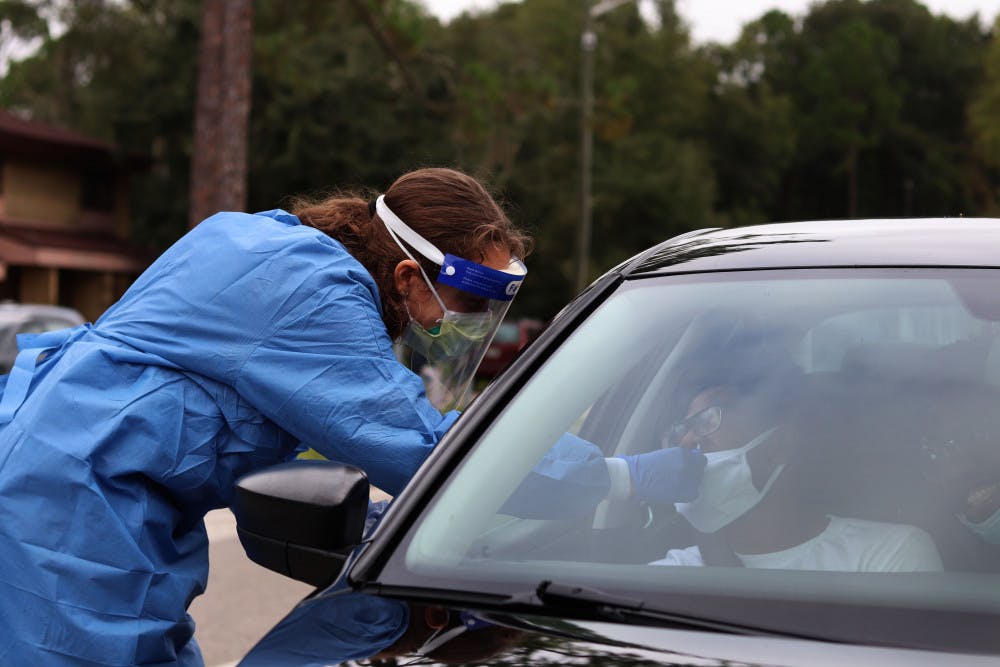Tens of UF students spent their afternoon trying to avoid awkward, drool-mouthed eye contact with their peers.
The group congregated at Broward Hall’s back courtyard for COVID-19 saliva tests — a service provided by UF Health Saturday, which started Sept. 19 — while maintaining a six-foot orbit, looking for a place to salivate in peace. No clear guidelines meant social distancing was up to them as they filled their tubes.
UF Screen, Test and Protect said it provided about 250 of these saliva tests at the Broward Hall site that weekend. This development in the university’s testing capabilities, along with weekly tests provided through screening questionnaires on students’ ONE.UF pages, came in response to the rising demand for tests after Labor Day.
UF is now focusing its surveillance testing on residence halls and Greek housing, wrote UF Health spokesperson Ken Garcia in an email.
Some new testing sites include Murphree and Weil Halls, the O’Connell Center, Fraternity Row, Sorority Row and the Levin College of Law west parking lot.
The new weekly questionnaires are nearly identical to students’ initial Return-to-Campus screenings, which students completed before Fall classes began.
Students and faculty can schedule tests through it regardless of symptoms. If a test is scheduled, the questionnaire will reappear after five days, Garcia wrote. Students can email student-screening@ufl.edu and request a reset for their questionnaire’s availability if they have been exposed since their last test.
The weekly questionnaires aren’t mandatory, but Garcia wrote they’re the easiest way to schedule tests, and UF Health highly encourages students and faculty to complete them.
Since Aug. 31, 1,864 students and faculty have tested positive for COVID-19 both on and off campus, according to UF Health’s dashboard. UF has tested 5,303 students and 155 employees this semester.
Chad Wishner, a 22-year-old fifth-year UF computer science student, said he wanted to get tested at the beginning of the semester. He gave up when he couldn’t figure out how.
“The testing infrastructure is so confusing and doesn’t make sense for the average student,” Wishner said.
Based on one of UF Health’s numerous COVID-19 web pages, he thought students could only get tested at the Student Health Care Center. Another website made him think he could only schedule a test via an email form through UF Health.
Wishner later tried to schedule a test again after he was exposed to COVID-19 but still didn’t know how.
He called UF Health about getting a test and said he was told the questionnaire’s link wasn’t displaying on some students’ pages. Students were supposed to email UF Health to resolve the issue.
Wishner said the questionnaire’s function should be more clear, and UF should be more transparent about its testing services. The link to the questionnaire doesn’t say it’s for scheduling tests; it simply reads “Open Screening Questionnaire.”
“It almost feels like they don't want people to know it exists,” he said.
Wishner eventually scheduled his test through the questionnaire for Sept. 12 at Broward Hall’s Teaching and Testing Center.
At the time, the Broward site provided nasal swab tests. UF introduced saliva tests Sept. 19 because they’re less invasive — and less painful.
But aside from the awkwardness of handing a warm tube of spit over to a health care worker, saliva tests have issues, too.
Some people might have trouble producing the necessary two cubic centimeters of saliva, and test recipients can’t have anything to eat or drink for 10 minutes before their test.
Garcia wrote nasal swab tests will be provided if they are needed, but Exactech and UF are no longer producing the 3D-printed swabs or the test’s mediums. He wrote the university is currently relying on a stockpile of these supplies should they be necessary.
UF Health can process about 1,000 tests a day, and students can expect results within 24 to 48 hours, he wrote.
He wrote UF doesn’t currently have plans to provide mandatory or walk-up testing. In a one-on-one with The Alligator, UF President Kent Fuchs said the university is considering mandatory testing for vulnerable groups, like people in labs or Greek housing.
“I don't understand why there isn't mandatory testing,” said Lela Myers, an 18-year-old UF exploratory freshman who was forced to live on campus as an out-of-state recipient of the Benacquisto Scholarship.
“They're being very lax about it and almost ignoring the fact that there's a pandemic,” Myers said.
The Alligator confirmed at least one positive case in her dorm, Reid Hall.
Before the weekly screenings became available, another student, who preferred to remain anonymous, said they also faced difficulties scheduling a test after their suitemate tested positive.
They said they weren’t symptomatic and unsuccessfully tried to schedule a test over several phone calls with UF Screen, Test and Protect and the Student Health Care Center.
By the fifth phone call, the student lied about having symptoms, and they were able to schedule a test.
They tested negative.
Hannah Lyons, 22, a UF first-year medical student, swabs a patient in the drive-through line in Gainesville, Fla., on Saturday, Sept. 19, 2020. UF Community Health and Family Medicine, SW Advocacy Group and the Alachua County Health Department teamed up to organize this free-testing event from 9a.m. - 1p.m. (Lauren Witte/Alligator Staff)






